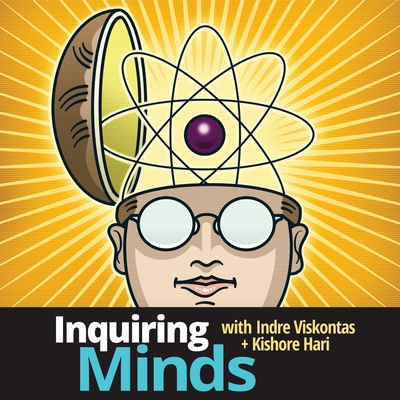Each week Inquiring Minds brings you a new, in-depth exploration of the places where science, politics, and society collide. We’re committed to the idea that making an effort to understand the world around you though science and critical thinking can benefit everyone—and lead to better decisions. We endeavor to find out what’s true, what’s left to discover, and why it all matters with weekly coverage of the latest headlines and probing discussions with leading scientists and thinkers. Inquiring Minds is hosted by neuroscientist and musician Indre Viskontas and science educator Kishore Hari. It’s produced by Adam Isaak in partnership with Climate Desk, a journalistic collaboration dedicated to exploring the impact of a changing climate and consisting of The Atlantic, Center for Investigative Reporting, Grist, The Guardian, The Huffington Post Mother Jones, Slate, and Wired. Our music is provided by award-winning producer Rhian Sheehan. RSS: http://feeds.feedburner.com/inquiring-minds iTunes: https://itunes.apple.com/us/podcast/inquiring-minds/id711675943 Stitcher: http://www.stitcher.com/podcast/inquiring-minds
https://soundcloud.com/inquiringminds
27 Ethan Perlstein - Scenes from the Postdocalypse
How do you become a scientist? Ask anyone in the profession and you'll probably hear some version of the following: get a Bachelor's of Science degree, work in a lab, get into a PhD program, publish some papers, get a good post-doctoral position, publish some more papers and then apply for a tenure-track job at a large university. It's a long road—and you get to spend those 10 to 15 years as a poor graduate student or underpaid postdoc, while you watch your peers launch careers, start families, and contribute to their 401(k) plans. And then comes the academic job market. According to Brandeis University biochemist Dr. Gregory Petsko, who recently chaired a National Academy of Sciences committee on the postdoctoral experience in the US, less than 20 percent of aspiring postdocs today get highly coveted jobs in academia. That's less than one in five. Naturally, many more end up in industry, in government, and in many other sectors—but not the one they were trained for or probably hoping for. "We're fond of saying that we should prepare people for alternative careers," explains Pesko, "without realizing that we're the alternative career." Ethan Perlstein was one of these postdocs—before he decided he'd had enough. He had gotten his Ph.D. at Harvard under Stuart Schreiber, the legendary chemist, and then gone on to a prestigious postdoctoral fellowship in genomics at Princeton. He'd published in top journals, like the Proceedings of the National Academy of Sciences and Genetics. He'd put in 13 years. But that "came to a close at the end of 2012," says Perlstein on this week’s episode, "when I encountered what I have been calling the postdocalypse, which is this pretty bad job market for professionally trained Ph.Ds—life scientists, in particular." After two years of searching for an assistant professorship, going up against an army of highly qualified, job-hungry scientists, he gave up. We talked to Perlstein about the postdocalypse, what it means for science, and what he’s doing about it. This episode also features a story about the upcoming release of the UN Intergovernmental Panel on Climate Change's report on global warming impacts, and a discussion about the difficult question of when screening for disease conditions is (and isn't) a good idea. iTunes: itunes.apple.com/us/podcast/inquiring-minds/id711675943 RSS: feeds.feedburner.com/inquiring-minds Stitcher: stitcher.com/podcast/inquiring-minds
